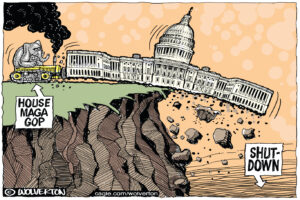Eat Your Cat Food, Mrs. Robinson
The new cost-of-living index proposed in Obama's latest budget is really a means to push lower living standards on people who need Social Security, University of Missouri economist Michael Hudson says.
The new cost-of-living index proposed in Obama’s latest budget is really a means to push lower living standards on people who need Social Security, University of Missouri economist Michael Hudson says.
The blandly named “Chained CPI” would require Social Security recipients to select cheaper goods and services, effectively diminishing — if not destroying — their quality of life by creating an official policy justification for the issuance of smaller pension checks.
Hudson explained the switch in detail Thursday on The Real News Network:
It’s not really a cost of living index. It’s a “cost of lower living standards” index. Yves Smith calls it the catfood index.
Here’s what it does: Suppose that you have to switch away from eating steak or eating meat or eating fish to eating canned tuna fish or canned beans. That’s considered a price reduction. If the chained index is done “properly,” anti-labor economists can cut Social Security by 50 percent. Here’s how. If people stop taking cabs and begin to take buses, that’s considered a lower cost of living. Well, what if they buy a bicycle? All Obama has to say is, “Look, folks! If you really want to save money, get a bike.” That’s what Margaret Thatcher said. That was one of her campaign slogans: “Get a bike!” So all of a sudden, the transportation in the cost of living goes down to zero.
People pay between 25 percent and 40 percent of their income on rent. Let them live out on the street. Let them live in a homeless shelter … About 15 percent of their income is spent on medical care. Let them do what George Bush said: Go to the emergency ward. That’s free. So the cost of living goes down!
If living standards are ground down and down because people are poor, then the government can say, “Because you’re getting poorer and poorer, your living standards have declined, so we don’t have to pay you so much to live.” This is no longer a price index. This is an index of declining living standards. Poverty will cascade downward, and so will the chained CPI. This gives new means to the working class being put in chains.
Below, hear Hudson’s essential points about Social Security and more about why the national debt is not the crisis officials are making it out to be. A transcript of the conversation between him and Real News Network senior editor Paul Jay immediately follows.
— Posted by Alexander Reed Kelly.
TheRealNews:
The Real News Network:
PAUL JAY, SENIOR EDITOR, TRNN: Welcome to The Real News Network. I’m Paul Jay.
President Obama released his budget, and the most controversial piece of it is he wants to make some cuts to Social Security. Now here’s a little bit of what he said: “Most economists agree that the chained CPI provides a more accurate measure of the average change in the cost of living.” This chained CPI is at the heart of the controversy, because critics are saying this is in fact a cut to Social Security benefits in the future.
Why is President Obama doing all this? Well, the logic for it is given more or less by The New York Times in their report on the budget. Here’s what they wrote:
Social Security benefits would increase from $860 billion next year, less than the projected $743 billion in payroll tax revenues for the program, to $1.4 trillion in 2023 fiscal year, about equal to the entire amount of discretionary spending, Medicare and Medicaid, which would total $504 billion and $267 billion, respectively, next year. Each would be nearly double those amounts in 2023, and interest on the federal debt, projected to be $222 billion next year, would be four times that in 2023.
Now joining us to talk about all of this is Michael Hudson. He’s a distinguished research professor of economics at the University of Missouri-Kansas City. His two newest books are The Bubble and Beyond and Finance Capitalism and Its Discontents. Thanks very much for joining us, Michael.
MICHAEL HUDSON, RESEARCH PROF., UMKC: Thank you, Paul.
JAY: So first of all let’s start with the New York Times quote, where they give a fairly apocalyptic sense of where we’re heading in terms of debt and Social Security and Medicare, Medicaid not being able to be paid for. What do you make of that?
HUDSON: It reminds me of The Hound of the Baskervilles, where Sherlock Holmes said the important thing is that the dog didn’t bark. When the government printed $13 trillion to give to the banks after the 2008 breakdown, nobody complained at all about the fact that the government can simply print the money and pour it into the economy. Nobody is complaining about the increased war spending that we’re doing, the waste that the Pentagon itself is complaining to congress about.
Why is it that these complaints focus on one particular small part of the budget, Social Security and medical care and health care? And the reason is this is pure, naked class war. There’s no other word for it. You can’t believe that people are being honest when they don’t talk about the whole budget or the overall economy when they’re single-mindedly tunnel-visioned, focused only on how do we pay retirees less, so that we can give the bankers more when President Obama continues the bank deregulation he’s sponsoring. The idea is to cut back Social Security in order to gear up for the next big bank bailout that’s going to result from current policies.
JAY: So what do you make of the prediction that deficit spending will lead to interest on the debt becoming four times what it is now? Isn’t that some kind of danger?
HUDSON: Not necessarily, for a number of reasons that the Obama administration is doing its best to obscure. First of all, when advocates of cutting back Social Security lobbyists use scare tactics to talk about the debt, they talk about a $16 trillion super-total. But of this, about $4 trillion, is owed by the government to the Federal Reserve, and another $2.5 trillion is owed to the Social Security fund. So for the $6.5 trillion the government pays interest to itself. This interest credit is a bookkeeping accounting fiction. This is not really paying a penny interest than the government receives as revenue on another part of its budget. It is not paying interest to bondholders or into the economy. When people start by talking about $16 trillion, you know that they’re not being honest.
JAY: Is the argument they would give that when the Fed gives money to the banks, as you were talking about in the bailout, they do eventually get paid back, don’t they? And in a sense it doesn’t create more debt. That’s the argument they give, whereas these payments on Social Security …
HUDSON: That brings up the second point I want to make. Every government’s debt tends to grow steadily over time. The Federal Reserve has rarely reduced its debt to the United States Government apart from the World War I and II debt. The debt it holds does not involve banks, you’re quite right. The Federal Reserve and the Treasury can simply create money on their own computer keyboards, just like banks can do electronically. It doesn’t cost a penny for them to create the money to pay Social Security recipients. They could simply print greenbacks, to make a long story short.
The debt is never paid back, but becomes in effect part of the money supply. Over two hundred years ago, already in 1776, Adam Smith wrote that no government ever has repaid its debt. So the debt doesn’t have to be repaid. It’s not like a private-sector account book where, if you run into debt, you have to keep paying the banks more on your credit card and your bank loan. This is zero-interest money. You’ve had Bill Black and my other University of Missouri-Kansas City colleagues on your show explaining this.
When people refuse to acknowledge what universities teach in their money and banking courses, you know that they’re pulling a con job on you.
JAY: There’s two sides to this. There’s the side of the money the Fed just simply creates. And then there’s the part where the government borrows money from outside sources. They borrow money by selling T-bills. At the moment this borrowed money is costing the government practically nothing, but that could change at a point.
HUDSON: It could, in which case there would probably be a shift away from borrowing from the public to simply monetizing it, which is what the U.S. government has always done in a pinch, as have the British government and the Chinese government. Any government that has a central bank has the option of doing that. So this to pretend that the debts to the banks and the bondholders are the whole thing just avoids looking at the real overall budget situation.
But to pick up your point, it also assumes that, “Okay, we’re going to be paying the rich much more interest.” Remember, the bondholders – the 1% – own maybe 75 percent of all the bonds. So if the government pays them a lot more interest and doesn’t tax them more, this is a pure giveaway to the 1%.
So what they’re really saying, The New York Times and the others, is that we’re running a probability of giving a huge amount of money to the wealthiest 1% in the future. In case we indeed do have to pay them more, we have to screw the Social Security recipients, screw the Medicare recipients, screw Medicaid. We have to squeeze the 99 percent more to pay higher interest to the 1% that are the bondholders.
JAY: Now, President Obama in this budget proposal wants to raise taxes on the wealthy, he says. Anyone over making more than $1 million he wants to pay, I think, a minimum of 30 percent tax. Is that something?
HUDSON: Yes. It’s a fraud. It’s doubletalk. Rich people don’t make income if they help it. To paraphrase Leona Helmsley, income is for the little people. Rich people make capital gains.
So they fill out your tax returns, they don’t say that they’re earning income. They report capital gains, taxed at a much lower rate. So what Obama is doing is flimflam. The Congressional Budget Office has shown that the wealthy people get most of their rise in net worth by capital gains, not income. He’s not making a peep about that.
JAY: The other argument I guess you hear from Obama supporters is that he’s dealing with a Republican-controlled House. I think the New York Times headline of the coverage of this was President Obama’s budget meant to engage the Republicans. So this is more about the politics than about the economics.
HUDSON: When they say “engage the Republicans,” this means that Mr. Obama realizes that as a follower of Rubinomics – Robert Rubin at Citibank – that he’s going to do something that most Democrats don’t like, He’s advocating a policy that most voters don’t like. So he’s trying to blame it on the Republicans. He’s “engaging” them simply in order to put the blame on them.
JAY: Just quickly dig into this CPI chained cost of living. Why are people criticizing this, and what does it mean?
HUDSON: It’s not really a cost of living index. It’s a “cost of lower living standards” index. Yves Smith calls it the catfood index.
Here’s what it does. Suppose that you have to switch away from eating steak or eating meat or eating fish to eating canned tuna fish or canned beans. That’s considered a price reduction.
If the chained index is done “properly,” anti-labor economists can cut Social Security by 50 percent. Here’s how. If people stop taking cabs and begin to take buses, that’s considered a lower cost of living. Well, what if they buy a bicycle? All Obama has to say is, “Look, folks! If you really want to save money, get a bike.” That’s what Margaret Thatcher said. That was one of her campaign slogans: “Get a bike!” So all of a sudden, the transportation in the cost of living goes down to zero.
People pay between 25 percent and 40 percent of their income on rent. Let them live out on the street. Let them live in a homeless shelter [crosstalk]
JAY: Because the point of this chained ….
HUDSON: … about 15 percent of their income is spent on medical care. Let them do what George Bush said: Go to the emergency ward. That’s free. So the cost of living goes down!
If living standards are ground down and down because people are poor, then the government can say, “Because you’re getting poorer and poorer, your living standards have declined, so we don’t have to pay you so much to live.” This is no longer a price index. This is an index of declining living standards. Poverty will cascade downward, and so will the chained CPI. This gives new means to the working class being put in chains.
JAY: And that’s because the concept behind this chained CPI is that people are finding cheaper ways to do things, ways that supposedly are not being reflected in the current system.
HUDSON: That’s right. People are having to walk to work instead of taking buses. They’re having to eat tuna fish and canned beans instead of buying fresh food on the table. Of course they’re finding cheaper ways. We call that declining living standards.
The starting point for Obama’s budget “reform” is to find the path of least resistance in screwing Social Security recipients, how can we pay them less to pay our campaign contributors, the 1%, more? They start by putting the class war back in business. They sugar-coat it by calling it a price index instead of a catfood index or declining living standards index. This is the politics of deception.
JAY: All right. Thanks for joining us, Michael.
HUDSON: Okay.
JAY: And thank you for joining us on The Real News Network.
Your support matters…Independent journalism is under threat and overshadowed by heavily funded mainstream media.
You can help level the playing field. Become a member.
Your tax-deductible contribution keeps us digging beneath the headlines to give you thought-provoking, investigative reporting and analysis that unearths what's really happening- without compromise.
Give today to support our courageous, independent journalists.






You need to be a supporter to comment.
There are currently no responses to this article.
Be the first to respond.